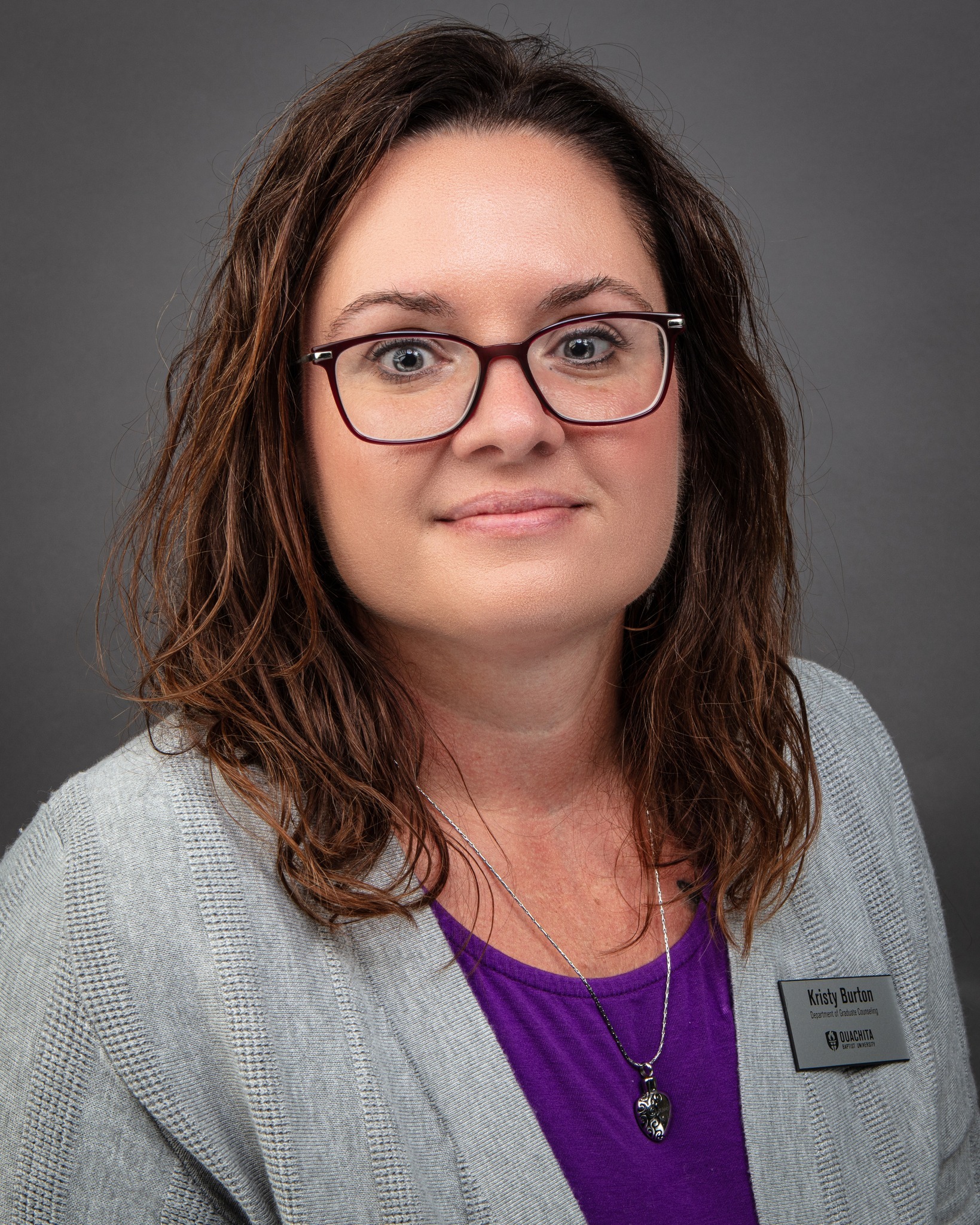Biography
Hi, I’m Kristy Burton. I’m the owner and Director of Arkansas Counseling and Wellness
Services, where I work with individuals facing a range of mental health and substance
use challenges. I’m based in our Fayetteville office and specialize in evidence-based,
compassionate care tailored to each client’s needs.
Before entering the counseling field, I spent nearly two decades in law enforcement
after earning my bachelor’s degree in criminal justice in 2001. I served as an officer
and instructor with Arkansas Community Corrections and U.S. Probation. I later earned
my M.S. in Community Counseling from John Brown University in 2013 and completed my
doctorate in Counselor Education and Supervision at the University of the Cumberlands.
I’m very excited to begin my role as Director of Clinical Training at Ouachita Baptist
University. In addition to my work at OBU, I serve as a professor at John Brown University
and enjoy mentoring counseling interns and new professionals. I currently serve as
Vice President of the Arkansas Addiction Professionals Association, President of the
Arkansas Association of Counselor Education and Supervision, and as a board member
for the Arkansas Substance Abuse Certification Board. I am also a board-certified
supervisor in Arkansas for both mental health and addictions.
In counseling, I use approaches like Emotionally Focused Therapy, Reality Therapy,
CBT, Motivational Interviewing, and Brainspotting to address issues such as trauma,
addiction, domestic violence, PTSD, anxiety, depression, and more.
Whether I’m in the classroom or the counseling room, I’m passionate about equipping
the next generation of counselors with the tools they need to serve others with excellence
and empathy.
Full CV
Q&A
Why did you come to Ouachita?
I came to Ouachita because I deeply value the integration of faith and learning, especially
in counselor education. The opportunity to invest in future counselors within a Christ-centered
environment is something I’m passionate about. Ouachita’s commitment to academic excellence,
spiritual formation, and community aligns closely with my personal and professional
values. As Director of Clinical Training, I’m excited to help shape the next generation
of counselors—equipping them not only with strong clinical skills, but also with the
character and compassion needed to serve others well.
Why did you decide to become a professor?
I became a professor because I believe in the power of education to transform lives—both
for the students in the classroom and the clients they will one day serve. After years
of working in counseling and supervision, I found myself drawn to teaching and mentoring
the next generation of counselors. I love helping students grow in confidence, develop
their clinical skills, and discover who they are as professionals. Being a professor
allows me to combine my passion for counseling, leadership, and faith while making
a lasting impact in the field.
Why is your subject an important one in our world?
Counseling is more important than ever in today’s world. People are facing increasing
levels of stress, trauma, isolation, and mental health challenges and they need trained,
compassionate professionals who can walk with them through those struggles. Counseling
helps individuals heal, grow, and build healthier relationships. It also promotes
justice, restoration, and hope in communities. By training counselors, we’re not just
teaching theory. We’re preparing people to be present in the hardest moments of others’
lives and to make a real difference through empathy, wisdom, and skill.
What do you want future students to know about your degree program?
I want future students to know that our counseling program is both academically rigorous
and deeply supportive. You won’t just learn theory, you’ll develop real-world skills,
receive meaningful supervision, and grow as a person and a professional. We care about
your character, your calling, and your clinical competence. You’ll be challenged,
encouraged, and equipped to serve others with integrity and compassion. If you feel
called to walk with people through life’s hardest moments and help them find healing,
this program will prepare you to do that with excellence and purpose.
What do you like to do in your free time?
In my free time, I love being outside, reading a good book, or spending time with
my husband, our kids, and our pets. I enjoy yoga, quiet mornings with coffee, and
find peace in prayer and reflection. I also love deep conversations with friends,
laughter, and any chance to be near water.
Before an injury took me out, I spent several years playing roller derby—which was
an intense, empowering, and fun chapter of my life. That experience taught me a lot
about teamwork, resilience, and pushing past fear. While I’m no longer skating, I
still carry those lessons with me in everything I do.
What has been a meaningful Bible verse or passage for you?
One passage that has been especially meaningful to me is Micah 6:8: "He has shown
you, O mortal, what is good. And what does the Lord require of you? To act justly
and to love mercy and to walk humbly with your God."
This verse grounds me both personally and professionally. In a world that often feels
chaotic, it reminds me of the simple, powerful call to justice, compassion, and humility.
Whether I’m working with clients, mentoring students, or navigating daily life, this
verse challenges and encourages me to lead with grace and purpose.
Publications
- Burton, K. (2025). Moral Reconation Therapy. The Encyclopedia of Mental Health Trainings,
Certification, and Credentials. Onbllc. 4634-4640
- Burton, K., Chamberlin, B., Simmons, R. (2025). Crisis and Trauma: Strategies for
Resilience and Recovery, Kendall Hunt.
- Burton, K. Beyond the books: Tackling the mental health crisis in higher education
- Burton, K., Perez, D., & Vinson, L. (2022). The Impact of Trauma-Informed Training
on the Leadership of Law Enforcement Officers and their interaction with Marginalized
Communities. International Association for Resilience and Trauma Counseling, 4, 36-41.
